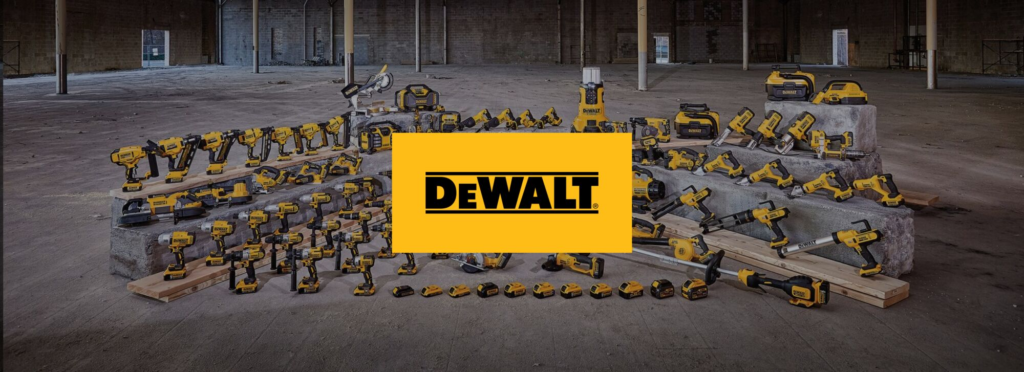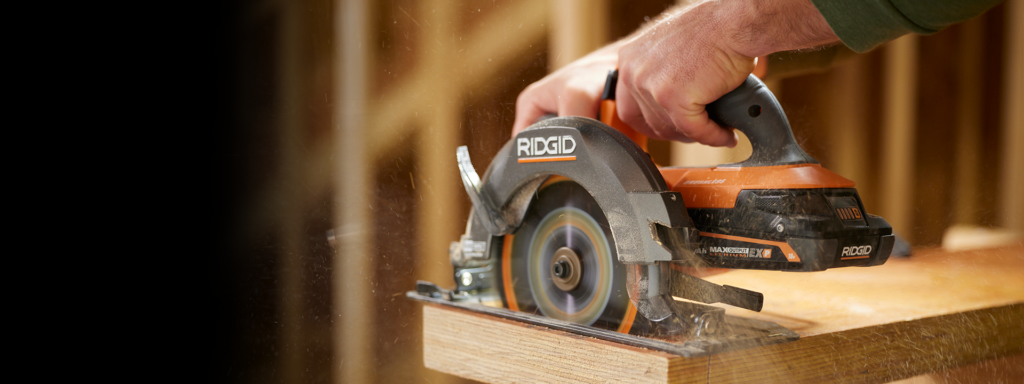
As the world of home improvement and DIY projects continues to evolve, cordless power tools have emerged as game-changers for hobbyists and professionals alike. The freedom and flexibility offered by these tools have transformed how we tackle renovations, repairs, and creative endeavors. In 2024, a new wave of innovation brings us some of the best brands dedicated to providing high-quality cordless power tools designed to make your projects easier and more efficient. Whether you’re a seasoned DIY enthusiast or just starting your journey, selecting the right tools can elevate your craftsmanship and simplify your tasks. In this article, we’ll explore the top brands that are making a mark in the realm of cordless power tools, ensuring that you have the best options at your disposal to unleash your creativity and tackle any challenge with confidence. Stay tuned as we dive into the standout brands of the year!
What should I look for in a cordless power tool?
When it comes to selecting cordless power tools, there are several key factors to consider that can significantly impact your overall satisfaction and the effectiveness of your projects. First and foremost, battery life is crucial. You want to ensure that the tools you choose have a long-lasting battery, as this will allow you to work on larger projects without the constant interruption of recharging. Look for lithium-ion batteries, as they tend to have better performance and longevity compared to older technologies. Additionally, check the amp-hour (Ah) rating, as a higher Ah typically indicates a longer run time.
Another important aspect is the weight and ergonomics of the tool. Since these tools are designed to be portable, you should look for options that are lightweight and easy to handle, reducing strain during prolonged use. Ergonomic designs with comfortable grips can make a significant difference, especially if you plan to use the tools for extended periods. It’s beneficial to test out the tools in person, if possible, to gauge how they feel in your hands and evaluate whether they will be comfortable during various tasks.
In addition to battery performance and ergonomics, consider the versatility of the cordless power tools you are looking to invest in. A multi-functional tool can save both time and money, allowing you to complete a variety of tasks without needing to buy multiple devices. Some brands offer a range of attachments that can turn a single tool into a versatile powerhouse for different applications. Moreover, look for features such as variable speed settings, torque adjustments, and integrated LED lights that can enhance usability and precision in your projects.
Finally, don’t overlook the brand reputation and warranty options when choosing cordless power tools. Established brands often provide reliable products with robust customer service and support. Research customer reviews and ratings, as they can give you insight into the performance and durability of the tools. A good warranty will also provide peace of mind, ensuring that you are protected against manufacturing defects and can seek assistance if issues arise. Knowing what to look for will guide you in making informed choices that align with your needs and lead to successful results in your DIY and professional endeavors.
How many volts do I need for a cordless drill?
When considering the purchase of a cordless drill, one of the key factors to evaluate is the voltage. The voltage of cordless power tools can significantly impact their performance and suitability for different tasks. Typically, cordless drills are available in a range of voltages, from around 12 volts for lightweight, everyday tasks to 20 volts or more for heavy-duty applications. The higher the voltage, the more power the drill can deliver, making it important to choose a voltage that aligns with your specific needs.
For home projects and lighter DIY tasks, a 12-volt drill may be perfectly adequate. These drills provide sufficient torque for assembling furniture, hanging pictures, or drilling holes into softer materials like wood. They are lightweight and easy to handle, making them ideal for users who don’t require excessive power. However, if your projects involve tougher materials or extended use, a 20-volt drill may be the better option. These higher voltage cordless power tools are designed to handle more demanding tasks, such as drilling into concrete or working with dense hardwoods.
In addition to voltage, it’s also worth noting that cordless drills come equipped with different battery types, which can further influence performance. Lithium-ion batteries, for instance, offer a consistent power output and longer runtimes compared to older nickel-cadmium variants. As such, when selecting the right cordless drill for your needs, consider not only the voltage but also the battery technology that will ensure optimal performance during your tasks.
Ultimately, choosing the right voltage for your cordless drill is essential for ensuring that you have the necessary power to complete your projects effectively. Whether you’re a casual DIY enthusiast or a professional tradesperson, understanding the capabilities of different voltages will help you make an informed decision. Invest some time in assessing your needs and the nature of the tasks you’ll be tackling, and you’ll be sure to find a cordless power tool that meets your expectations and enhances your productivity.
Is it worth buying cordless power tools?
In recent years, the popularity of cordless power tools has surged, fundamentally changing the landscape of home improvement and construction projects. The convenience offered by these tools is one of their most significant advantages. Without the hindrance of a power cord, users can move freely without worrying about tripping hazards or being confined to a specific workspace. This feature is particularly beneficial in outdoor projects or large areas where access to electrical outlets is limited. Additionally, advancements in battery technology have significantly improved the performance and longevity of cordless power tools, making them a more viable option for both professionals and DIY enthusiasts alike.
Another compelling reason to consider investing in cordless power tools is their versatility. Many manufacturers now offer a wide range of tools that operate on the same battery platform, enabling users to swap batteries between tools seamlessly. This not only saves time and space but also minimizes the need for carrying multiple chargers and cords. Whether it’s a drill, saw, or sander, having a cohesive set of cordless tools allows for smoother transitions between tasks, enhancing overall productivity and efficiency. Moreover, the weight of cordless tools tends to be lighter compared to their corded counterparts, reducing fatigue during prolonged use.
However, it’s essential to evaluate your specific needs before making a purchase. While cordless power tools offer unmatched flexibility, they may come at a premium price, especially high-performance models. Some users might find that if their projects are limited to a small, fixed workspace, corded tools still offer consistent power and generally lower costs. Additionally, the performance metrics, such as torque and battery life, can vary significantly across brands and models, so thorough research is crucial to ensure you’re making the best choice for your requirements.
Ultimately, the decision to invest in cordless power tools comes down to weighing the pros and cons against your particular needs and project scope. If mobility, ease of use, and versatility are high on your priority list, cordless power tools certainly provide significant advantages that make them worth considering. With the right selection tailored to your tasks, these tools can enhance the quality of your work and simplify the process, making the investment a sound choice for many.Cordless power tools have gained immense popularity among both DIY enthusiasts and professional tradespeople, making them an attractive option for those considering a tool upgrade. One of the main advantages of cordless power tools is their portability. Without the constraint of cords, users can operate them in a variety of locations, from tight indoor spaces to expansive outdoor settings. This flexibility allows for greater efficiency, as individuals can quickly move from one task to another without the hassle of managing tangled power cords or finding nearby outlets.
What is the best brand of cordless power tools?
When it comes to choosing the best brand of cordless power tools, several key factors come into play that can affect both performance and user satisfaction. Popular brands like DeWalt, Milwaukee, Makita, and Bosch have established solid reputations over the years for their innovation, durability, and overall power tool efficiency. Each of these brands offers a comprehensive range of cordless power tools designed for various applications, from heavy-duty construction tasks to intricate home improvement projects.
DeWalt has long been a favorite among professionals and DIY enthusiasts alike, thanks to its robust lineup of cordless power tools that deliver high performance and reliability. With advancements in battery technology, DeWalt’s 20V MAX system has become especially popular for its extended run time and compatibility with a wide array of tools. Similarly, Milwaukee is known for its substantial focus on user feedback and technological innovation, resulting in a line of tools that are not only powerful but also ergonomically designed to enhance user experience.
On the other hand, Makita stands out for its lightweight designs and impressive battery efficiency. Their cordless power tools often feature brushless motors, which contribute to longer run times and decreased maintenance needs. Makita has been particularly noted for its diverse selection of tools that cater to various trades, making it a versatile choice for those needing specialized equipment. Meanwhile, Bosch maintains a strong foothold in the market by offering smart technology integrations, which enable users to connect their tools with mobile apps for improved functionality and management.
Ultimately, the best brand of cordless power tools for you will largely depend on your specific needs and applications. Whether you prioritize powerful torque, long battery life, or innovative features, it’s essential to consider the tasks you’ll typically undertake and understand the strengths of each brand. By evaluating your requirements and testing out different options, you can make an informed choice that enhances your efficiency and enjoyment in any project.
Who makes the most powerful cordless tools available today?
In recent years, the market for cordless power tools has seen a significant transformation, with various brands competing to design and produce the most powerful options available today. It is essential to recognize that the impact of advancements in battery technology has played a crucial role in this evolution. Lithium-ion batteries, in particular, have allowed manufacturers to create tools that not only provide higher voltage and longer run times but also enhance portability and user convenience. As a result, professionals and DIY enthusiasts alike are turning to cordless power tools that combine efficiency with the freedom of movement.
Leading the charge in this rapidly evolving industry are some well-known brands like DeWalt, Milwaukee, and Makita. DeWalt is renowned for its robust and durable lineup of tools that can withstand the rigors of construction sites while delivering impressive power. Milwaukee has carved a niche for itself with its focus on innovation and technology, often introducing tools equipped with advanced features like automatic torque adjustment. Meanwhile, Makita has gained a reputation for producing high-performance tools that are both lightweight and powerful, making them favorites among tradespeople looking for mobility without sacrificing strength.
New contenders have also emerged, challenging the status quo and pushing the boundaries of what’s possible in cordless power tools. Brands like Ryobi and Bosch have focused on creating value-driven products that cater to a wide variety of users, from casual homeowners to seasoned professionals. Their offerings may not always compete on sheer power but excel in versatility and adaptability, making them appealing choices for those seeking a balance between performance and cost. These companies have successfully carved out their market share by understanding the needs and preferences of their target audiences.
Ultimately, the driving force behind the growth of the cordless power tool industry is a blend of competition, innovation, and consumer demand for more powerful, efficient, and user-friendly options. As manufacturers continue to invest in research and development, the tools of tomorrow promise to be even more capable, pushing the limits of what we can achieve with cordless technology. The future holds exciting possibilities, and it’s clear that the quest for the most powerful cordless power tools will remain at the forefront of this dynamic and expanding market.
Which is better Makita or DeWalt?
When it comes to choosing between Makita and DeWalt, both brands have built a solid reputation in the world of cordless power tools. Over the years, they have developed innovative products that cater to both DIY enthusiasts and professional contractors. Makita is often praised for its ergonomic designs and lightweight tools that enhance user comfort during prolonged use. Their 18V cordless power tools, for instance, feature advanced battery technology that provides longer run times and faster charging capabilities, making them ideal for heavy-duty tasks.
On the other hand, DeWalt has carved out a niche for itself by focusing on durability and performance. Their cordless power tools are known for their rugged construction, which can withstand tough job site conditions. The DeWalt FLEXVOLT system, which allows users to switch between 20V and 60V batteries, provides versatility unmatched by many competitors. This feature is particularly appealing for professionals who require reliable power for demanding applications without the hassle of multiple tool systems.
When evaluating which brand might be better for your needs, it ultimately boils down to personal preference and specific application requirements. Users who prioritize lightweight tools for extended use may lean toward Makita, while those who need robust, heavy-duty equipment might favor DeWalt. Both brands offer a comprehensive suite of cordless power tools, ranging from drills and saws to impact drivers, ensuring that users can find tools suited to their specific projects.
In conclusion, whether Makita or DeWalt is the superior choice largely depends on your preferences and job requirements. Both manufacturers provide high-quality, reliable products that cater to different needs in the crowded marketplace of cordless power tools. Considering your specific usage scenarios and testing out tools from both brands can help you make an informed decision tailored to your individual needs.

Is Ridgid as good as DeWalt?
When it comes to choosing cordless power tools for both professional and DIY projects, two brands frequently come up in conversation: Ridgid and DeWalt. Each brand has its strengths and unique offerings, making them popular choices among tradespeople and home improvement enthusiasts alike. DeWalt, known for its extensive range of durable and reliable tools, has built a solid reputation over the years. Their cordless power tools are particularly favored for their innovative technology, long battery life, and performance, which makes them a preferred choice for heavy-duty tasks.

On the other hand, Ridgid also boasts a loyal following, primarily due to its commitment to quality and robust construction. While Ridgid may not have the same level of brand recognition as DeWalt, it is renowned for its user-friendly designs and lifetime service agreement, which offers peace of mind to buyers. Ridgid’s cordless power tools are designed for versatility, catering to a wide range of applications, from plumbing to woodworking. Their tools are often praised for their solid performance and affordability, making them an attractive option for those on a budget.
When comparing Ridgid to DeWalt, it ultimately comes down to the specific needs of the user. Professionals who require high-performance tools for demanding jobs might lean towards DeWalt for its proven track record in the industry. Conversely, DIY enthusiasts and those who prioritize long-term service coverage may find Ridgid’s offerings more suited to their needs. Both brands provide a variety of cordless power tools that can handle a range of tasks, but users should consider factors such as tool design, battery compatibility, and warranty options when making their decision.
Ultimately, while DeWalt may have the edge in terms of reputation and an extensive lineup of high-end tools, Ridgid remains a formidable competitor, particularly for those seeking reliable tools without breaking the bank. Evaluating one’s specific requirements, work style, and budget will help users determine whether Ridgid is as good as DeWalt for their particular situation. With both brands offering quality products, it’s clear that there’s no one-size-fits-all answer, and each option has its merits in the ever-evolving landscape of cordless power tools.
Which is cheaper DeWalt or Milwaukee?
When it comes to cordless power tools, two of the most popular brands on the market are DeWalt and Milwaukee. Both brands have built a solid reputation for producing high-quality tools that meet the demanding needs of professionals and DIY enthusiasts alike. However, budget is always a concern when making a purchasing decision, and many consumers often wonder which brand offers a more affordable range of products.
In general, DeWalt tends to provide a slightly lower price point for its cordless power tools compared to Milwaukee. This is particularly evident in their selection of entry-level models, which are often designed for ease of use and practicality, making them ideal for homeowners or casual users who may not require the robust features that a professional tradesperson might seek. DeWalt’s focus on practicality often translates into an accessible price range, making these tools appealing for those who want reliability without breaking the bank.
On the other hand, Milwaukee also offers a wide array of cordless power tools, many of which are equipped with advanced technology and features that cater to professionals. While some of their premium models can be on the pricier side, it’s important to note that the investment often pays off in terms of durability and performance. For professionals who rely on these tools day in and day out, the longevity and efficiency of Milwaukee products can justify the higher cost.
Ultimately, the choice between DeWalt and Milwaukee may come down to individual needs and preferences. For those who are budget-conscious and looking for reliable, everyday cordless power tools, DeWalt might be the more attractive option. Conversely, for professionals who are willing to invest more for superior quality and advanced features, Milwaukee could be worth the extra expenditure. The decision really hinges on specific requirements, and it’s always wise to consider both cost and functionality before making a purchase.
Are Milwaukee tools worth the money?
Milwaukee tools have carved a niche for themselves in the competitive landscape of power tools, particularly when it comes to cordless power tools. The brand’s commitment to quality and innovation has earned it a dedicated following among professionals and DIY enthusiasts alike. But are these tools truly worth the investment? The answer largely depends on the user’s needs, the variety of tasks at hand, and the overall reliability demanded from the tools.

One of the standout features of Milwaukee tools is their robust construction and cutting-edge technology. The brand is known for its powerful battery systems, which provide impressive run times and consistent performance, making them ideal for heavy-duty applications. Additionally, Milwaukee has invested significantly in research and development, often leading the market with new features such as smart technology integration that enhances usability and efficiency. This focus on innovation not only ensures durability but also means that users are getting tools that can adapt to the evolving demands of their work.
Cost is always a consideration when investing in tools, and Milwaukee is often priced at a premium compared to some competitors. However, many users find that the long-term benefits, such as lower maintenance needs and extended lifespans, justify the initial expense. Professionals who rely on their tools daily often report that Milwaukee’s performance far outweighs the upfront costs, thanks to the reduced downtime and the tools’ ability to withstand rigorous use over time.
In conclusion, Milwaukee tools, particularly their cordless power tools, are generally considered worth the money for those who value quality and reliability. While the initial investment may be higher, the return in terms of durability, performance, and efficiency can often save users both time and money in the long run. For anyone serious about their work—whether on a job site or home project—Milwaukee offers a compelling choice that combines advanced technology with solid craftsmanship.

